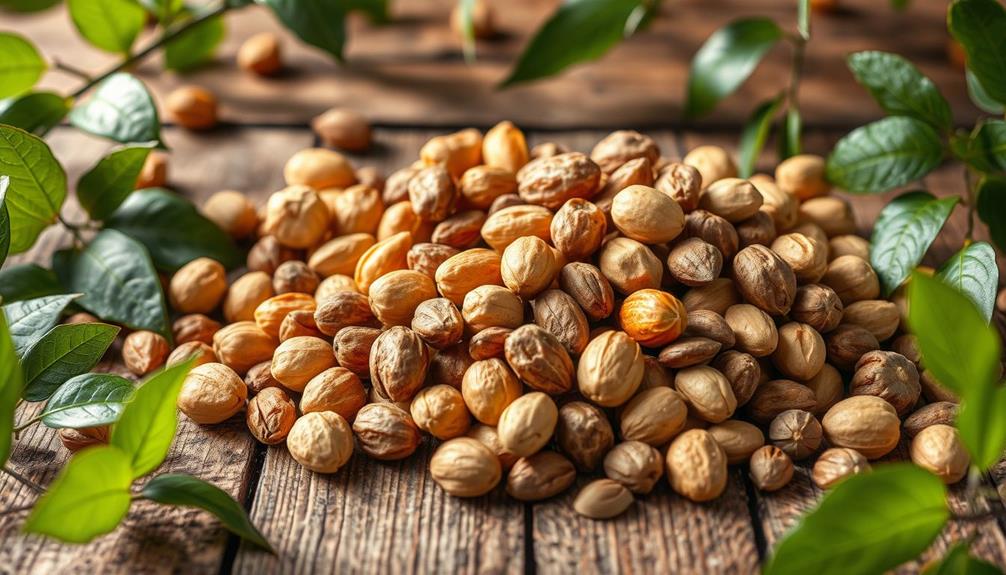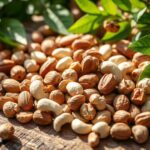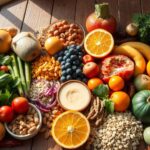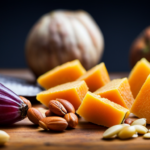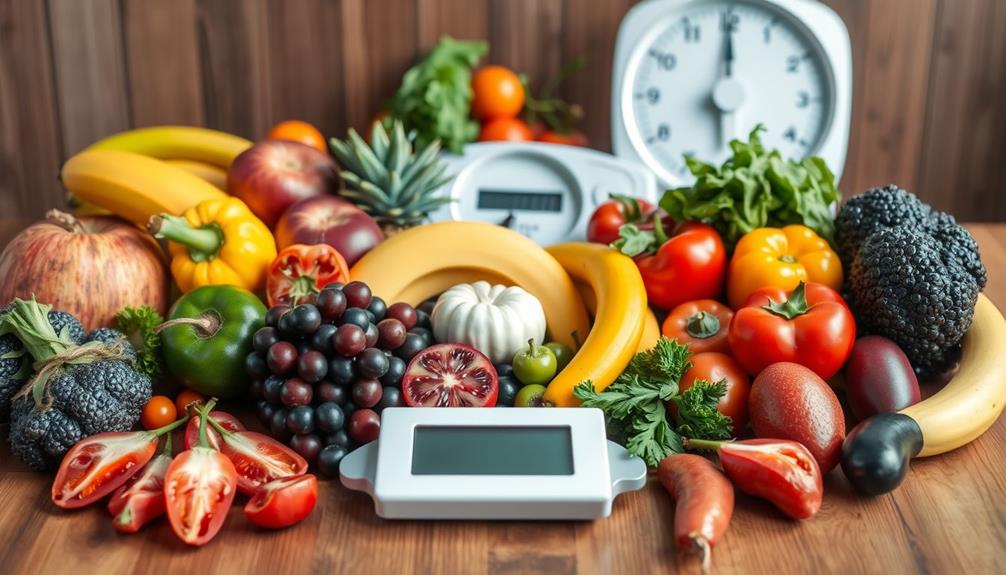Yes, nuts can be raw food if they're unprocessed and haven't been heated above 118°F (48°C). This keeps their natural nutrients and enzymes intact, offering various health benefits. However, some types, like U.S. almonds, may require pasteurization to reduce the risk of harmful bacteria. While raw nuts are packed with healthy fats, protein, and fiber, they can also harbor bacteria and naturally occurring toxins. Soaking raw nuts can help improve digestibility and confirm their status. Want to know more about how to choose the best nuts for your diet? Keep exploring those intriguing details!
Key Takeaways
- Raw nuts are unprocessed and not heated above 118°F (48°C), retaining their natural nutrients and enzymes.
- Some raw nuts may undergo pasteurization to reduce foodborne illness risks, which slightly alters their nutritional content.
- Soaking nuts can help indicate if they are pasteurized; mold growth suggests they are untreated.
- Raw nuts are rich in healthy fats, protein, fiber, and antioxidants, offering numerous health benefits.
- It's essential to choose raw or dry-roasted nuts and check labels to confirm their processing status.
Understanding Raw Nuts
Understanding raw nuts begins with recognizing what sets them apart from their roasted counterparts. Raw nuts, like almonds and walnuts, are unprocessed and haven't been subjected to any heating processes above 118°F (48°C). This guarantees they retain their natural nutrients and enzymes, making them a powerhouse of health benefits.
Additionally, incorporating foods with anti-inflammatory properties, such as chamomile and ginger, can complement the health benefits of raw nuts. When you choose raw nuts, you're opting for nutrient-dense snacks packed with healthy fats, protein, fiber, vitamins, and minerals. These elements contribute to their high nutritional value, which aligns perfectly with a raw food diet.
However, it's crucial to note that while many nuts are marketed as "raw," some, particularly almonds in the U.S., may undergo pasteurization to mitigate foodborne illness risks.
Nutritional Benefits of Nuts
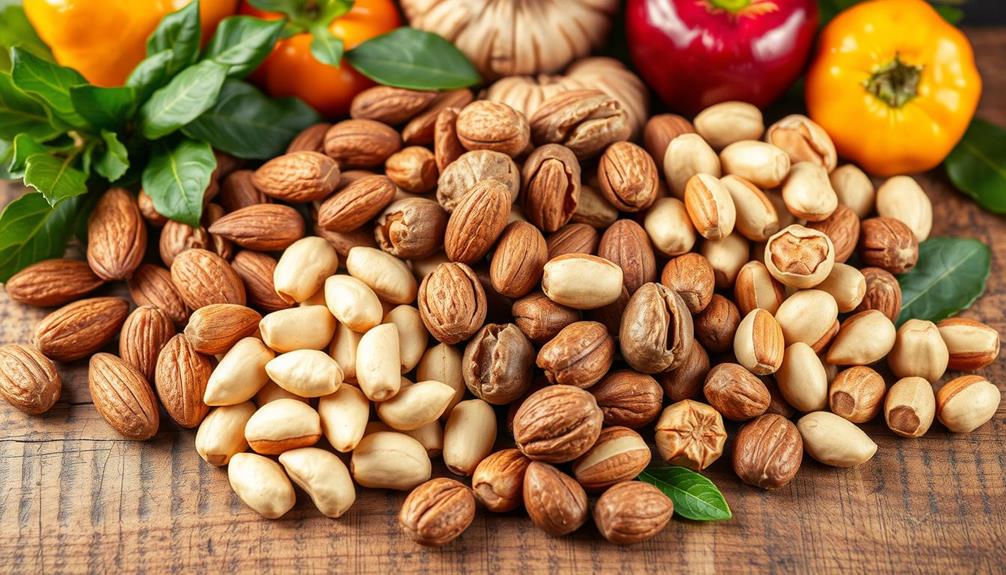
Enjoying the nutritional benefits of nuts can considerably enhance your health. These small powerhouses are packed with essential nutrients that contribute to overall well-being. Incorporating nuts into your diet can also complement other healthy lifestyle choices, like staying hydrated and maintaining a balanced diet, which are key factors in managing conditions such as gout nutrition.
Here are some key benefits of including nuts in your diet:
- Healthy fats: Nuts are rich in unsaturated fats, which help lower bad cholesterol levels.
- Antioxidants: They contain antioxidants that fight inflammation and oxidative stress in your body.
- Heart health: Regular nut consumption is linked to reduced risk of heart disease and improved cholesterol levels.
- Dietary fiber: Nuts provide dietary fiber, aiding digestion and promoting a feeling of fullness, which can assist in weight management.
- Plant-based power: They're a great source of plant-based foods, offering a nutritious alternative to animal products.
Incorporating about 1.5 ounces of nuts into your daily routine can lead to significant health improvements, including better heart health and reduced inflammation.
Potential Risks of Nuts
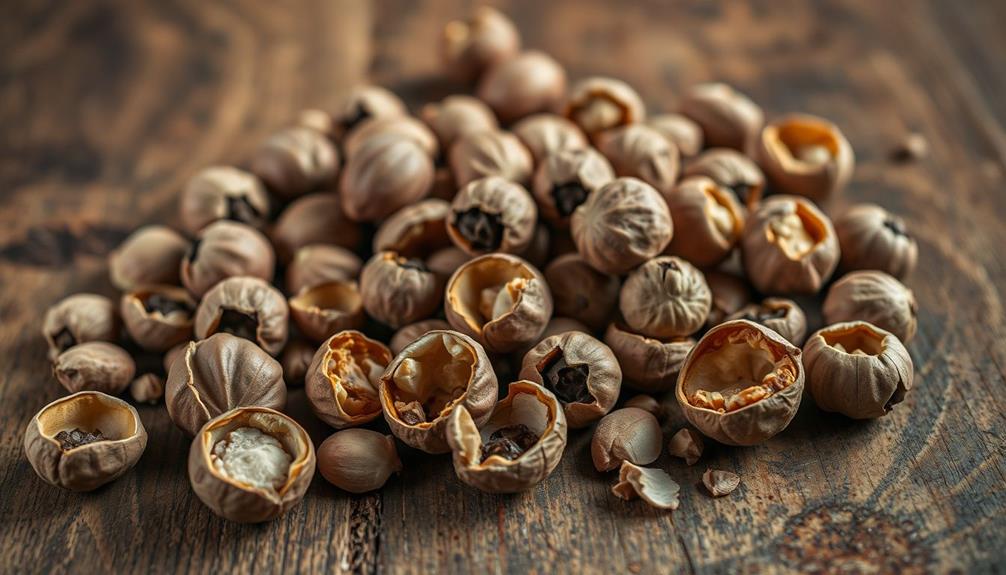
While nuts are often celebrated for their health benefits, it's important to be aware of the potential risks associated with consuming them raw. Raw nuts can harbor harmful bacteria such as Salmonella and E. coli, especially when they come from unpasteurized sources. This increases your risk of foodborne illness, which can lead to serious health issues.
Additionally, certain raw nuts, like kidney beans and cassava, contain naturally occurring toxic compounds that are neutralized through cooking. Essential oils for health may provide complementary support for various ailments related to digestive issues or respiratory health.
You also need to be cautious about the quantity of specific nuts you consume. For instance, eating excessive Brazil nuts could result in selenium poisoning, causing symptoms like nausea and gastrointestinal distress.
While pasteurization can reduce the risk of harmful bacteria, it may slightly alter some nutritional content, though the nutrient loss is minimal compared to the safety benefits.
If you're unsure about the pasteurization status of raw nuts, soaking them can help. Pasteurized nuts won't sprout, and if you notice mold growth in soaked nuts, they likely haven't been treated.
Cooking and Processing Methods
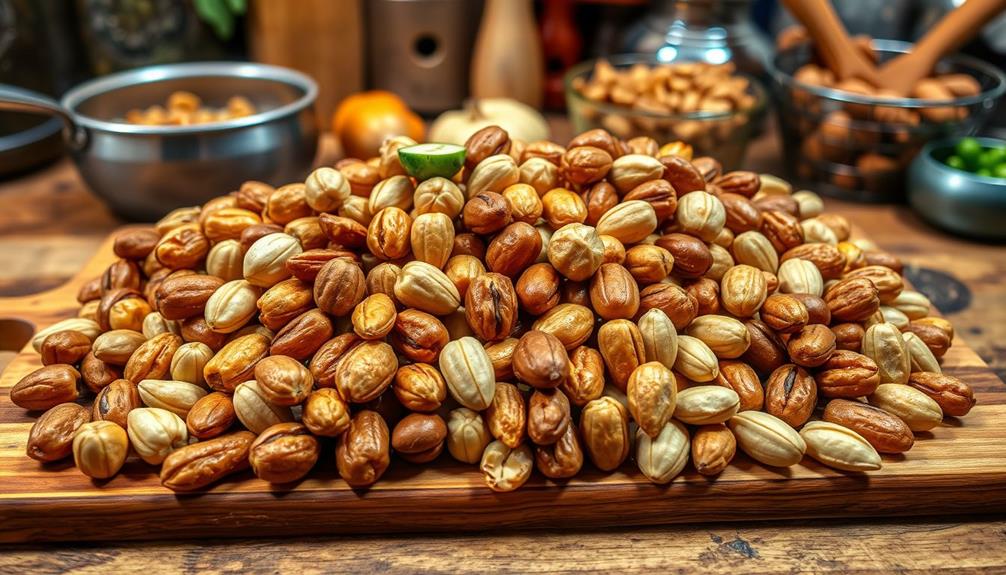
Nuts' versatility makes them a popular snack choice, but the way they're cooked or processed can greatly impact their nutritional value and flavor. Here are some key points to ponder:
- Raw nuts retain most of their natural nutrients and are rich in antioxidants, which can be beneficial for overall health, similar to the benefits of daily consumption of cranberry juice.
- Roasting enhances flavor but may reduce beneficial compounds.
- Pasteurization is required for almonds in the U.S. to lower Salmonella risks.
- Processed cashews are typically roasted or steamed due to toxic shells.
- Soaking nuts improves digestibility and activates enzymes.
When you consume raw nuts, you're getting a wealth of nutrients, but processing methods like roasting can enhance the taste. However, this might come at a cost to some of their nutritional content. For example, roasted nuts might lose certain antioxidants compared to their raw counterparts.
Soaking is a popular technique in raw food diets as it prepares nuts for better digestion and maximizes enzyme activation, making the nutrients more bioavailable.
While you might enjoy the crunch of roasted nuts, reflect that opting for raw nuts can offer a more nutrient-dense option, keeping those natural nutrients intact.
Ultimately, knowing how nuts are processed can help you make informed choices for your diet.
Choosing the Right Nuts
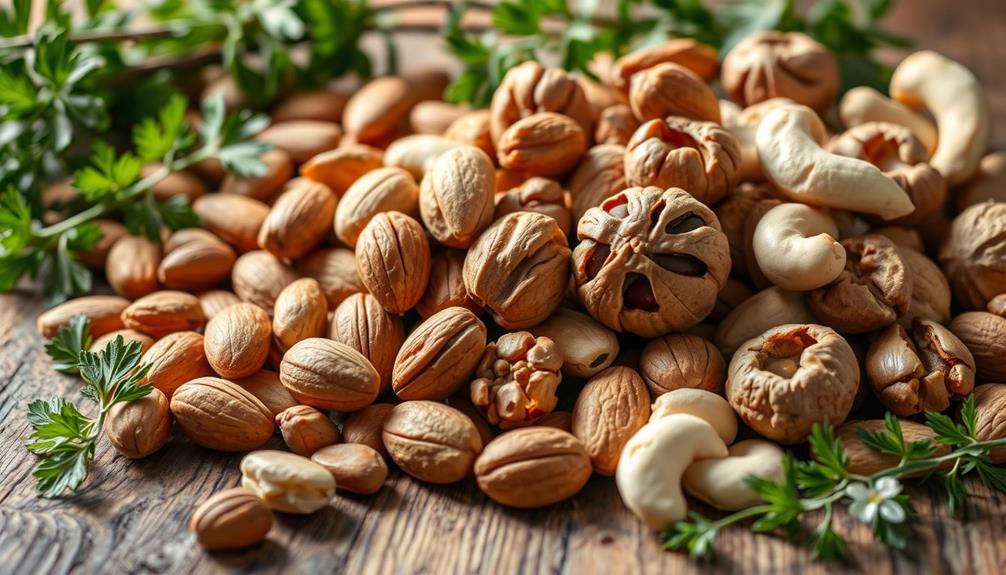
When it comes to choosing the right nuts, focusing on quality and preparation can greatly enhance your health benefits. Opt for raw or dry-roasted varieties, as they typically retain more nutrients and avoid unhealthy fats found in oil-cooked options. Always look for unsalted nuts to minimize excess sodium, which can be detrimental to your health.
Additionally, like various brewing methods that affect caffeine content, the preparation of nuts can influence their nutritional profile. Be cautious with labels; some nuts labeled as "raw" may have been pasteurized. True raw nuts shouldn't be exposed to heat above 118°F, so it's important to verify their processing.
Incorporating a variety of nuts into your diet—like almonds, walnuts, and pecans—can provide you with unique nutritional profiles rich in healthy fats, fiber, and essential vitamins.
Innovative coffee gear can also enhance your snack experience when paired with nuts. Mind your portion sizes when enjoying these calorie-dense foods. A recommended serving is about 1.5 ounces of whole nuts or 2 tablespoons of nut butter.
Frequently Asked Questions
Are Nuts Considered Raw Food?
Nuts can be considered raw food if they're unprocessed and haven't been heated above certain temperatures. However, many commercially available nuts are pasteurized, so you need to check labels carefully to verify they're truly raw.
Is It OK to Eat Raw Nuts Everyday?
Yes, it's perfectly fine to eat raw nuts every day. They're packed with essential nutrients and healthy fats, but remember to stick to a serving size of about 1.5 ounces to keep your diet balanced.
How to Know if Nuts Are Raw?
To know if your nuts are raw, check labels for "raw" or "unroasted," soak them to see if they sprout, and remember, almonds might be pasteurized despite their label. Stay informed and shop wisely!
Are Raw Nuts a Healthy Snack?
Yes, raw nuts are a healthy snack! They're packed with nutrients, healthy fats, and fiber. Just remember to enjoy them in moderation to reap the benefits without overdoing the calories. Your body will thank you!
Conclusion
In the world of nutrition, raw nuts stand as a vibrant symbol of health, packed with essential nutrients that boost your well-being. Yet, their processed counterparts offer convenience and enhanced flavors that can't be ignored. Balancing these choices is key; while raw nuts bring purity, roasted ones can elevate your culinary experiences. Ultimately, it's about finding what fits your lifestyle. Embrace the richness of both, and let your taste buds guide you to a fulfilling, nutritious journey.

